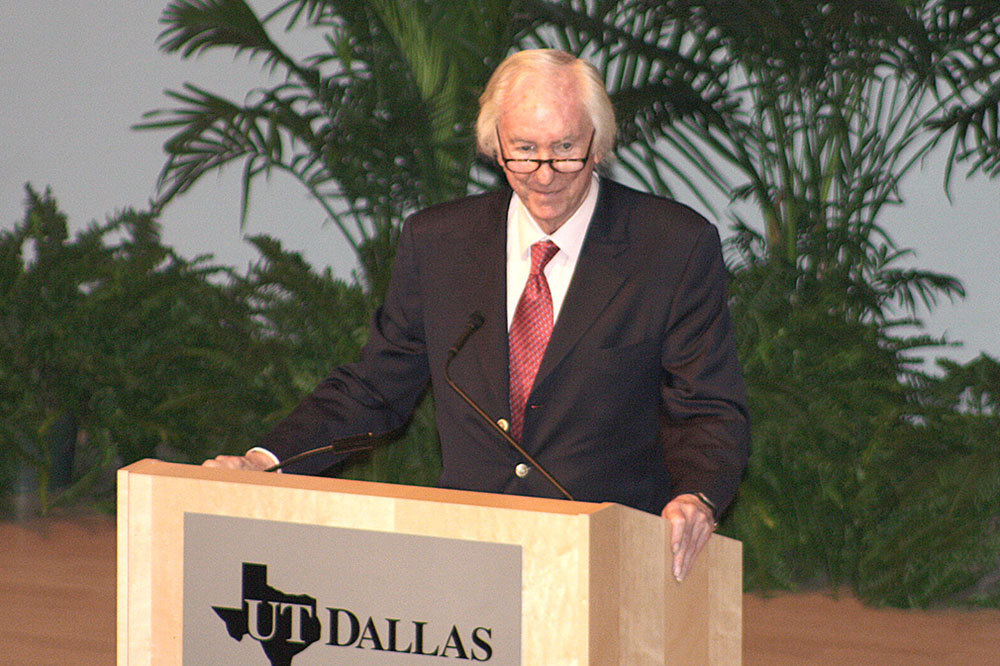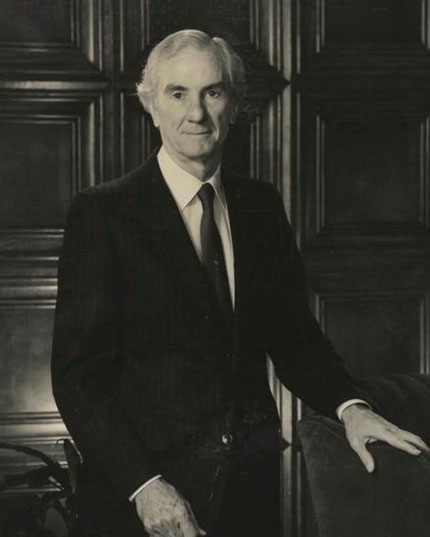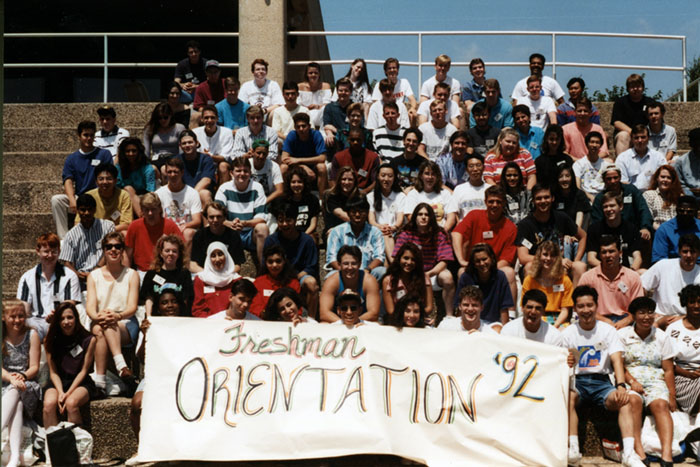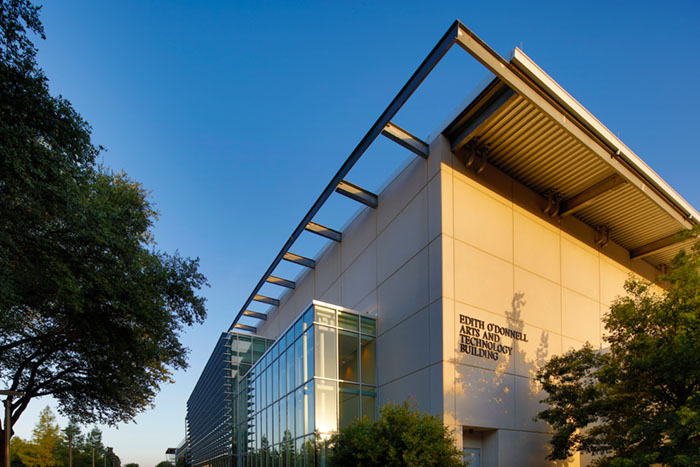UT Dallas Mourns Loss of Visionary Philanthropist Peter O’Donnell Jr.
By: Heidi Harris Cannella | Oct. 15, 2021

Peter O’Donnell Jr., a visionary force behind the expansion of The University of Texas at Dallas and one of its most generous benefactors, died peacefully at home Oct. 10. He was 97.
Known for their civic and business leadership, Peter and his wife, Edith O’Donnell, who died in 2020, established the O’Donnell Foundation in 1957. Their foundation has played an inimitable role in advancing higher education and scientific research not only at UT Dallas, but throughout Texas. Their financial contributions over the years to UT Dallas alone total more than $40 million.
“Peter O’Donnell Jr. was perhaps the most influential Texan of his generation,” UT System Chancellor James B. Milliken said. “Few people have done as much to advance the state of Texas as a powerhouse for research and innovation. In many ways, he helped shape the Texas we all share today. Through decades of strategic philanthropy alongside his beloved wife, Edith, he launched moon-shot advancements in math, science, computing and the arts. These investments helped UT Dallas become a top-tier research institution and catalyzed the public-private partnerships that have made UT Austin and the city of Austin a world-leading center for technology. And his most recent act was to ensure that UT Southwestern Medical Center would become a premier institution for advancements in the neurosciences.”

Dr. Hobson Wildenthal, who was one of the most influential leaders at UT Dallas over three decades as provost and executive vice president, often referred to O’Donnell as the “fourth founder” of UT Dallas.
O’Donnell was instrumental in securing $6 million in startup monies in the late 1980s from the Texas Legislature to enable UT Dallas to begin granting four-year undergraduate degrees, in addition to its long-established doctoral and master’s programs.
“Peter O’Donnell’s leadership in securing for UT Dallas the authority to teach engineering and to have a full, legitimate four-year undergraduate program made possible all that has been accomplished in the succeeding decades,” said Dr. Richard C. Benson, UT Dallas president and the Eugene McDermott Distinguished University Chair of Leadership. “His advocacy and his generosity, along with that of his wife and their foundation, have changed UT Dallas — and the world — for the better in profound ways.”
In Memoriam
Memorials to honor Peter O’Donnell Jr.’s life and legacy to UT Dallas may be made online as part of New Dimensions: The Campaign for UT Dallas.
In addition to O’Donnell’s assistance navigating the political processes that allowed UT Dallas to evolve, the O’Donnell Foundation has been among the University’s most significant benefactors in the last half-century, though many of the gifts were contributed anonymously. The O’Donnell support included a $1 million fund for Presidential Scholarships in 1989 and a $5 million endowment for a Leadership Fund for the University president in 2005. A $5 million anonymous gift in 2012 helped to establish the Texas Biomedical Device Center, along with contributions from Texas Instruments Inc. and the UT System Board of Regents. Focused on technologies to prevent injuries, detect impairments, and restore quality of life lost due to neurological injuries and disease, the center developed a therapy for stroke that was recently approved by the Food and Drug Administration.
“Peter O’Donnell’s leadership in securing for UT Dallas the authority to teach engineering and to have a full, legitimate four-year undergraduate program made possible all that has been accomplished in the succeeding decades. His advocacy and his generosity, along with that of his wife and their foundation, have changed UT Dallas — and the world — for the better in profound ways.”
Dr. Richard C. Benson, UT Dallas president
“Peter O’Donnell was fundamental to the development and growth of UT Dallas — as he was for so many institutions,” said Dr. Inga Musselman, provost, vice president for academic affairs and the Cecil H. Green Distinguished Chair of Academic Leadership. “Both he and Edith O’Donnell, through their philanthropy and volunteerism, worked tirelessly — and for many decades anonymously — to elevate education, access to the arts, and medical care and research across Texas and beyond. We are fortunate and grateful to have benefited from their vision.”

While Peter O’Donnell’s early influence set UT Dallas on a trajectory to its Tier One status, he and his wife also were key supporters in adding the “A” — arts — to the STEAM (science, technology, engineering, arts and mathematics) curriculum for which the University is known. In 2013 the Edith O’Donnell Arts and Technology Building was dedicated in her honor. The following year, they made a $17 million gift to establish the Edith O’Donnell Institute of Art History. The O’Donnells also made several multimillion-dollar donations to establish endowments to recruit and retain faculty for the School of Arts, Technology, and Emerging Communication.
“Peter’s role in the arts was done in partnership with Edith, so I feel that the Edith O’Donnell Institute of Art History owes him a great deal,” said Dr. Michael Thomas, director of the O’Donnell Institute and holder of the Richard R. Brettell Distinguished University Chair. “He played a major role in the creation of our institute, and we see his influence in our mission to engage science and technology — two of his great passions — in our approach to the study of art. Both Peter and Edith shared a vision that the institute would capitalize on UTD’s well-established STEM programs in order to foster innovative and interdisciplinary teaching and research in art history.”

The O’Donnells’ generosity is also evident at UT Southwestern Medical Center — home of the Peter O’Donnell Jr. Brain Institute — and at Edith O’Donnell’s alma mater, UT Austin, home of the O’Donnell Building for Applied Computational Engineering and Sciences. Additionally, their gifts have endowed hundreds of chairs, professorships and fellowships throughout the UT System and led to the construction of state-of-the-art facilities for research and teaching across the state.
The O’Donnell Foundation, which has donated more than $780 million since its founding, primarily supports engineering, science and math education along with arts programs. The foundation has been a longtime supporter of the Dallas Symphony Orchestra, the Dallas Opera and the Dallas Museum of Art, among many organizations. Most recently, the O’Donnell Foundation made a $2 million commitment to support the construction of the UT Dallas Athenaeum as part of New Dimensions: The Campaign for UT Dallas.
“Both he and Edith O’Donnell, through their philanthropy and volunteerism, worked tirelessly — and for many decades anonymously — to elevate education, access to the arts, and medical care and research across Texas and beyond. We are fortunate and grateful to have benefited from their vision.”
Dr. Inga Musselman, provost and vice president for academic affairs
In 1996 O’Donnell founded the Advanced Placement Incentive Program, which dramatically increased the number of high school students, especially Hispanic and Black students, who pass college-level exams in math, science and English. The incentive program served as the model for both the state of Texas and the federal AP incentive programs.

O’Donnell was a fellow of the American Academy of Arts and Sciences, a member of the Presidents’ Circle of the National Academies, a member of President Ronald Reagan’s Foreign Intelligence Advisory Board, a commissioner of the Texas National Research Laboratory Commission and was appointed to the Texas Select Committee on Higher Education. He was also awarded the Santa Rita Award, the highest honor bestowed by the UT System Board of Regents, in 1986, and in 2014, the Kay Bailey Hutchison Distinguished Service Award from The Academy of Medicine, Engineering and Science of Texas, which he co-founded with Hutchison and two Nobel laureates.
Born April 21, 1924, O’Donnell grew up in Highland Park, Texas. He earned a bachelor’s degree in mathematics at the University of the South in Tennessee and a Master of Business Administration from the Wharton School of the University of Pennsylvania.
“He played a major role in the creation of our institute, and we see his influence in our mission to engage science and technology — two of his great passions — in our approach to the study of art. Both Peter and Edith shared a vision that the institute would capitalize on UTD’s well-established STEM programs in order to foster innovative and interdisciplinary teaching and research in art history.”
Dr. Michael Thomas, director of the Edith O’Donnell Institute of Art History at UT Dallas
After three years of service in the Navy during World War II, he returned to Texas and met Edith Jones in 1948. They married in 1952 and have three daughters: Ann O’Donnell, Carol Kradolfer and Ruth Mutch. He is also survived by six grandchildren and two great-grandchildren.
A private service will be held at a later date.
Media Contact: The Office of Communications and Marketing, or the Office of Media Relations, UT Dallas, (972) 883-2155, newscenter@utdallas.edu.





